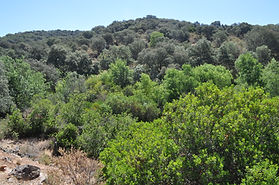

Ignacio M.
Pérez-Ramos
2.1 Functional diversity in Mediterranean plant communities
From my postdoctoral stay in CEFE (Montpellier), I am particularly interested in categorizing plant communities based on their functional attributes, predicting their responses to changes in environmental conditions as well as inferring ecosystem properties of ecological and agricultural importance (such as net primary productivity) following a trait-based approach.

One of my most relevant contributions regarding this issue has been to confirm that the global paradigm on leaf economy (resource acquisition versus conservation) can be generalized to the whole-plant and the community level in both Mediterranean rangelands and woodlands (JVS, in press). This finding allowed us to introduce for the first time the concept of “plant community economics spectrum”, based on a strong coordination between above- and below-ground components (J. Ecology 100: 1315-1327).

I am also interested in understanding which factors and rules govern the process of assembly in Mediterranean plant communities. In a recent study (Oikos 125: 354–363 ), we propose a new practical method to quantify the relative importance of species turnover (distinguishing between species occurrence and abundance) versus intraspecific variation, which allowed us to better understand the assemblage rules of these plant communities along environmental gradients.


Finally, I have also participated in a study where we evaluated the functional response of shrubland communities located in southwest Spain (Doñana National Park) to an extreme climatic event of severe drought and cold winter that happened in 2005. This extreme climatic event induced rapid vegetation changes, modifying several functional properties of the community. However, the rapid convergence of these shrubland communities to the initial conditions supports the existence of strong mechanisms of functional resilience.